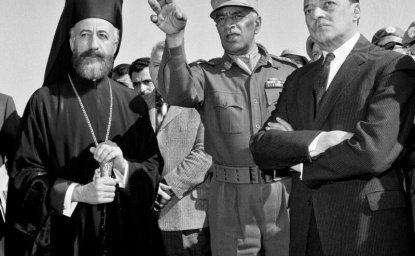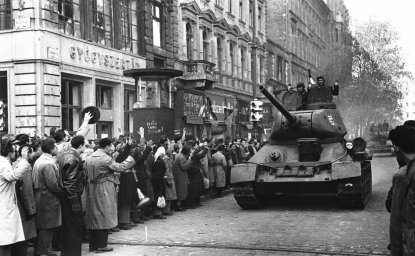Call for Papers for the international conference The Euromissiles Crisis and the End of the Cold War, 1977-1987, to be held in Rome, Italy on December 10-12 2009.
Convened by: The Machiavelli Center for Cold War Studies (CIMA); the Woodrow Wilson Center's Cold War International History Project (CWIHP); the Craxi Foundation; the George Washington University's National Security Archive; the University of Paris III-Sorbonne Nouvelle; and the University of Paris I-Pantheon Sorbonne;
Organized in cooperation with: Bundeskanzler Willy Brandt Stiftung and the London School of Economics' Cold War Studies Centre.
Scientific Committee: Leopoldo Nuti, Frédéric Bozo, Christian Ostermann, Marie-Pierre Rey, Thomas Blanton, and Bernd Rother.
Background
The Euromissiles crisis was a decisive moment in the history of the Cold war. It came at a moment when Détente was rapidly deteriorating and tensions were quickly building up across the globe. Many historians have argued that together with the Soviet invasion of Afghanistan two weeks later, the December 1979 NATO dual track decision marked a watershed between the previous period of Détente and the following return to a harsh confrontation between the blocs. At the same time, the formal ending of the crisis with the 1987 Treaty of Washington ushered in an unprecedented era of improved relations between the superpowers and it may well have helped unleash those forces that brought about the final collapse of the Soviet bloc a few years later.
The aim of this conference is to explore the origins, unfolding, and consequences, of the Euromissiles affair within the wider framework of the last phase of the Cold War in Europe. Regarding the origins of the crisis, we will explore the process leading up to NATO's dual track decision and the role of the various actors involved. Was it the result of a European proposal spurred by the deployment of the new Soviet SS-20 missiles and/or by the fear of decoupling? Or was it the consequence of a unilateral U.S. hegemonic choice, cunningly sold to the gullible Europeans and with no real connection to the Soviet initiative?
We will then investigate the unfolding of the crisis and its impact upon the events that culminated in the end of the Cold War. It is important to explore the interconnection between the domestic settings of Eastern and Western countries and the dynamic of the crisis. What was the impact of the peace movements and of the mobilization of civil society? It is also necessary to examine the wider diplomatic and strategic ramifications of the crisis. What were the links between the Euromissiles crisis and the other crises of the time, either at the global level (e.g. Afghanistan) or the European level (e.g. Poland)?
Questions also arise about the second phase of the period, namely after the US began deploying its missiles in late 1983-early 1984. What were the factors and actors transforming the situation from one of confrontation to one of negotiation? On the other hand, what was the impact of that change on the evolution of the domestic setting, in particular in the East? How dangerous were the many crises that punctuated the eight years between NATO's decision to deploy the missiles and the 1987 Washington treaty that called for their withdrawal?
Finally, we want to explore the impact of the crisis on the evolution of the Cold War as a whole, and possibly on its winding down. Did the deployment of the missiles, as the so-called Reagan victory school has been arguing, really contribute to the Soviet strategic defeat and to the Western "victory", thanks to its superior economic, political, and strategic cohesion? Did it facilitate the emergence of those factors which would help overcome the East-West division throughout all European societies, by promoting a new level of civic awareness, raising a new consciousness across Europe of the dangers of the Cold War, and indirectly linking for the first time Western peace activists with Eastern dissent? Or did it actually prolong the Cold War, as some other historians have argued, by forcing upon an already dying bipolar international system a new round of rearmament and military expenditures that actually helped--at least for a few years--the survival of the Soviet system by offering the Soviet leaders a pretext to mobilize its last resources and call its public opinion to arms to defend the motherland against this renewed imperialist challenge?
Thirty years after NATO's December 1979 dual track decision, the time has come to try to answer these questions and to study this crucial episode of the Cold War through rigorous historical analysis. The opening up of new archival sources in Europe and in the United States offers an unprecedented opportunity to challenge the existing interpretive paradigms and to come up with fresh and innovative explanations. The origins of the NATO decision and its political implications, as well as Soviet reactions, can now be studied in much more depth and detail. It is also time to break the existing disciplinary boundaries and work for a broad synthesis that integrates the strategic and military dimension of the crisis with the study of the political relevance of the peace movements that burst out in Western Europe and the U.S. in the first half of the 1980s.
To this purpose, the Machiavelli Center for Cold War Studies (CIMA), the Craxi Foundation, the George Washington University's National Security Archive, the Universities of Paris I (Pantheon Sorbonne) and Paris III (Sorbonne Nouvelle), and Woodrow Wilson Center's Cold War International History Project are hosting a conference in December 2009 on "The Euromissiles Crisis and the End of the Cold War, 1977-1987."
Topics to be addressed by paper proposals
We invite papers dealing with all aspects of the whole period, and, in particular, on such topics as the origins of NATO's INF modernization program (including technological and military breakthroughs in the 1970s or the neutron bomb controversy); Soviet decision making in the Euromissile crisis and its reception in the Eastern bloc; Détente and its domestic critics in the West; country studies (the U.S., France, Great Britain, Italy, West Germany, the Netherlands, Belgium, etc); the role of key personalities (Luns, Giscard d'Estaing, Carter, Schmidt, Craxi, Kohl, Mitterrand, Reagan, Gorbachev.) and/or crucial decision making moments (the Guadaloupe meeting, the Reykjavik meeting); the role of peace movements; Olov Palme, Willy Brandt and others in the search for new dimensions of European security; 1983 as the year of maximum danger; the impact of the crisis on cultural patterns (including cinema and literature).
Procedure
The organizers would, of course, be happy to consider additional proposals which potential contributors believe would fit into the overall intellectual framework of the conference.
The deadline for proposals is April 27, 2009.
Proposals should include a title, a single spaced one page abstract (no more than 500 words) and a one page CV of the author with a list of major books and articles. Please make sure to send your files as attachments with the proponent's name clearly visible on the top of each page. The scientific committee will select papers to be presented at the Conference on the basis of the proposals. Following the acceptance of the proposals (by mid-May), authors will receive editorial guidelines (e.g. format of the papers). In order for the papers to be available to conference participants beforehand, authors will be asked to submit their draft papers by November 30, 2008.
Our aim is to publish conference papers in a collective volume and/or in a special issue of a scholarly journal, based on an evaluation of the written contributions by the scientific committee. Those papers selected by the Committee, however, will still have to undergo a peer review process. In order for the publication to proceed swiftly, the deadline for the submission of final drafts of the selected papers will be March 31, 2010.
Proposals should be emailed or sent by regular mail to Prof. Leopoldo Nuti:
nuti@uniroma3.it
Prof. Leopoldo Nuti
Dipartimento di studi internazionali
Via G. Chiabrera 199
00145 ROMA
ITALY

Cold War International History Project
The Cold War International History Project supports the full and prompt release of historical materials by governments on all sides of the Cold War. Read more


History and Public Policy Program
A leader in making key foreign policy records accessible and fostering informed scholarship, analysis, and discussion on international affairs, past and present. Read more




